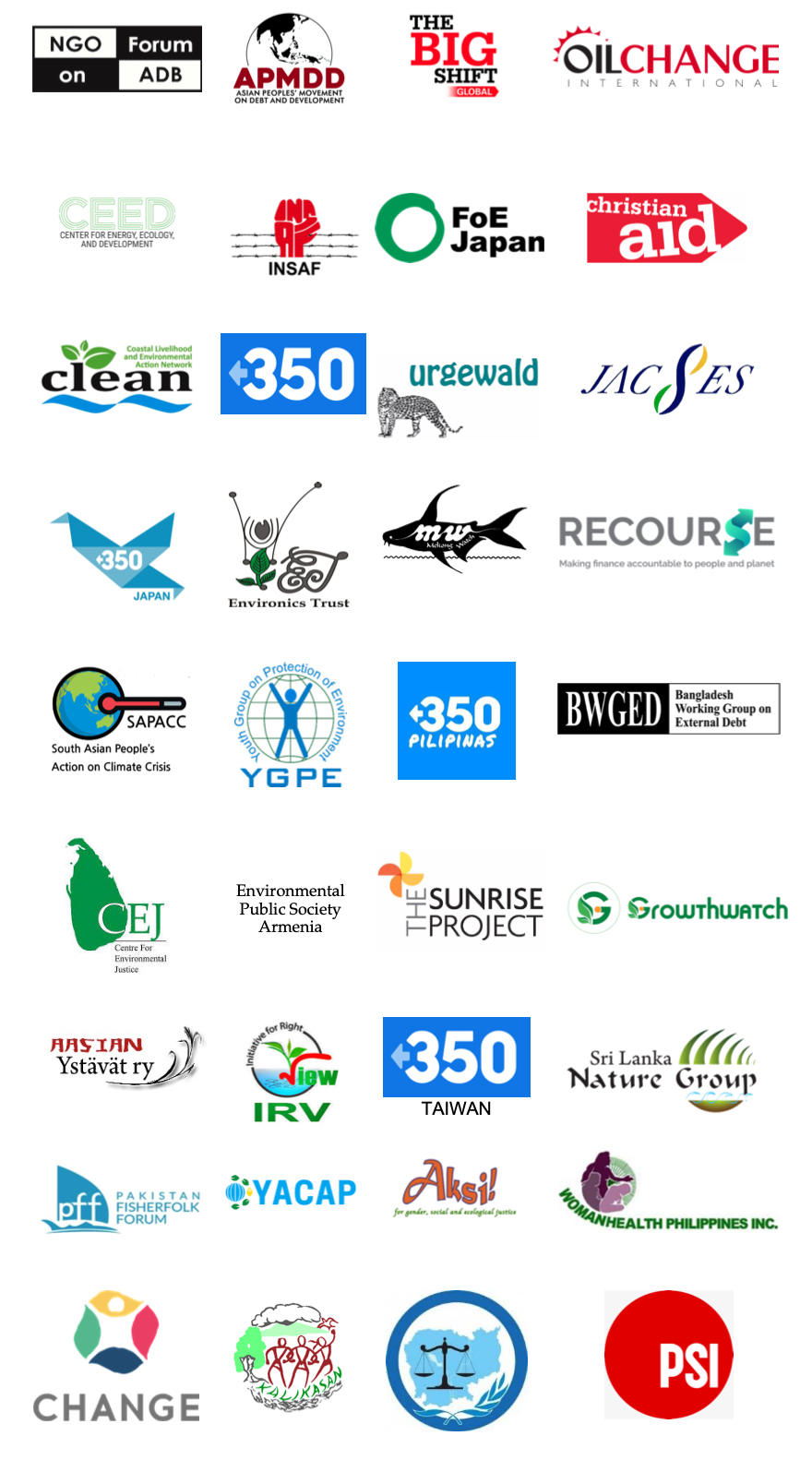Below is the letter sent by 36 organizations to Asian Development Bank President Masatsugu Asakawa. You can download the full letter as a PDF here.
3 March 2021
MR. MASATSUGU ASAKAWA
President
Asian Development Bank
Dear President Asakawa,
We are at a pivotal moment in the climate emergency. The longer action is delayed, the harder it will be to avoid the worst climate impacts and ensure a just transition for workers and communities. We, the undersigned 36 organizations from 15 countries, urge you to meet this moment by ending the Bank’s financing and support for fossil fuels.
We understand that the Bank is currently revising its energy policy. What the Bank decides now will set the course for whether we cut global carbon emissions by 2030 and stop harming communities with dirty fossil fuel projects, or fail to protect our planet and communities. We urge you to demonstrate meaningful climate leadership by including a provision in the revised energy policy that explicitly ends Bank financing and support for fossil fuels.
The climate crisis poses the greatest existential threat to our planet and our communities. The IPCC has warned that we must cut global greenhouse gas emissions roughly in half by 2030 to avert the most catastrophic impacts. While governments and other multilateral banks are increasingly turning away from gas, coal and oil, the ADB’s continued support for fossil fuels undermines global climate action and puts local communities’ health at risk.
The ADB has spent roughly $10 billion on fossil fuels since its 2009 energy policy was released. The Bank is ramping up its financing of fossil gas projects such as the controversial Turkmenistan – Afghanistan – Pakistan – India (TAPI) gas pipeline project. The Bank also funded the Rupsha 800 MW Combined Cycle Power Plant in Bangladesh despite its proximity to the river-systems of the Sundarban Mangrove Forest, threatening the livelihoods of about 1,500 fisherfolk communities. These large financial investments in high-risk and outdated technologies also pose a potential future risk to the ADB’s balance sheet.
As the leading contributor to global fossil emissions increases, gas sector growth poses one of the greatest threats to meeting the goals of the Paris Agreement. Life cycle emissions from gas generate significant methane emissions. Methane is a climate crisis accelerator and is over 80 times more harmful to the climate than CO2 on a 20 year basis. In 2019, methane emissions were responsible for around 20% of total GHG emissions. If the ADB continues to invest in fossil fuels including gas, the Bank will lock in emissions that we cannot afford and likely create stranded assets that will particularly burden developing member countries into the future.
ADB management has conceded that its energy policy “is no longer adequately aligned with the global consensus on climate change, ongoing global transformation of the energy sector, and operational priorities of ADB’s new Strategy 2030.”
During the last year, the global consensus on fossil fuel finance has radically shifted. The European Union, UK and US recently made commitments this year to stop financing fossil fuel infrastructure at home and abroad. This follows the European Investment Bank’s decision to end its financing of gas, coal and oil projects and become the world’s first climate bank. This has set a new marker for what it means to be a climate leader. As the chair of the Multilateral Development Bank Working Group on Paris Alignment, it’s critical that the Bank build on these path breaking commitments and end its fossil fuel financing.
The ADB’s support for gas, oil and coal undermines its own mission to achieve “a prosperous, inclusive, resilient, and sustainable Asia and the Pacific, while sustaining its efforts to eradicate extreme poverty.” Harvard researchers recently estimated that nearly 1 in 5 premature deaths are attributable to fossil fuel pollution. Faced with the COVID-19 pandemic, communities with preexisting health conditions due to fossil fuel pollution and extractive projects are doubly vulnerable. Communities impacted by fossil fuel projects are often excluded from project planning processes and face environmental and social impacts and human rights violations. These injustices have sparked communities’ opposition, leading to threats and reprisals – a glaring disconnect from real, sustainable development outcomes. Further, in light of the social and environmental impacts of Bank-financed hydropower, waste to energy and geothermal projects, we urge the Bank to stop financing these false solutions in the name of climate finance.
Instead of continuing support for fossil fuel and other destructive projects which may become future financial liabilities, the ADB must commit to a climate safe and equitable future which puts the Bank on a sustainable course. In relation to energy, this means rapidly scaling up investments for renewable energy, including making grants available for public and social ownership of integrated systems, energy efficiency, community microgrids to maximize energy access, and just transition for workers and communities dependent on fossil fuel production. Becoming a true climate bank must include aligning all financing and activities — including private sector financing and financial intermediation — with a high probability 1.5°C emissions pathway and ensuring meaningful consultation with impacted communities.
At this critical moment, we urge the ADB to demonstrate meaningful climate leadership and stop fueling the climate crisis with its financing and support for fossil fuels.
We look forward to your reply.
Sincerely,
Rayyan Hassan
Fossil Free ADB Coalition
This letter is endorsed by the following organizations:

